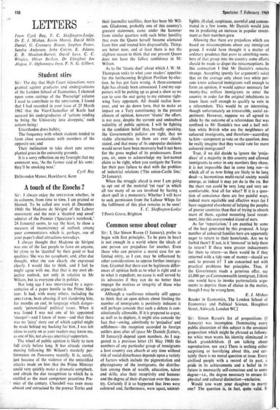Common sense about colour
Sir: I, like Simon Raven (3 January), prefer to begin with first principles. To be pure in heart is not enough in a world where the ideals of one person are prejudices for another. Even those who can perceive a moral case for un- limited entry, as I can, may be influenced by other considerations to oppose further immigra- tion. Granted that there can be legitimate differ- ences of opinion both as to what is right and as to what is expedient, no cause is well served by its advocates if they can do no better than impugn the motives or integrity of those who argue against it.
Although a vociferous minority still appear to think that an open debate about limiting the number of immigrants is positively indecent it will perhaps concede that such a debate is con- stitutionally allowable. If it is prepared to argue, as well as to deplore, it might also concede the fact that—owing, admittedly to 'prejudice' and selfishness—the reception accorded to foreign settlers does after all (pace Mr Daniels [Letters, 10 January]) depend upon numbers. As I sug- gested in a previous letter (31 May 1968) the numbers of any particular group of immigrants a host country can absorb at any time without risk of social disturbance depends upon a variety of factors which include the pigmentation and physiognomy of the immigrants, the distribu- tion among them of wealth, education, talent and skills, also their receptivity and humour and the degree of their dispersion over the coun- try. Certainly if it so happened that Jews were coloured and, furthermore, were squatomintel- ligible, ill-clad, suspicious, scornful and concen- trated in a few towns, Mr Daniels would join me in predicting an increase in popular resent- ment as their numbers grew.
Allowing that there are prejudices which are based on misconceptions about any immigrant group, I would have thought it a matter of ordinary prudence that prior to admitting mem- bers of that group into the country some efforts should be made to dispel the misconceptions. In this connection I find Mr Daniels's remarks strange. Accepting (purely for argument's sake) that on the average only about two white per- sons know coloured immigrants well enough to form an opinion, it would appear necessary for twenty-five million immigrants to enter the country in order for the original inhabitants to know them well enough to qualify to vote in a referendum. This would be an interesting, though unfortunately an irreversible, social ex- periment: However, suppose we all agreed -to abide by the outcome of a referendum that was confined to Mr Daniels's two and a. half mil- lion white British who are the neighbours of coloured immigrants, and therefore—according to him—competent to vote on the question, does he really imagine that they would vote for more coloured immigrants?
True, if we did decide to ignore the 'preju- dices' of a majority in this country and allowed immigrants to enter in any numbers they chose, it is not impossible that in some long run—in which' all of us now living are likely to be long dead—a harmonious multi-racial society would emerge, as indeed it may yet do in the us. But the short run could be very long and very un- comfortable. And all for what? If it is a ques- tion of conscience there are less painful ways, indeed more equitable and effective ways (as I have suggested elsewhere) of helping the peoples of poorer countries than that of trying to absorb more of them, against mounting local resent- ment, into this overcrowded island of ours.
As for 'repatriation,' 1 am puzzled -by some of the heat generated by this proposal. A large number of coloured families here are apparently eager to return to their homelands. Are we to forbid them? If not, is it 'immoral' to help them to return? If there were greater inducements for them to return—as there would be if they returned with a tidy sum of money—should we seek to prevent it? I am concerned not with practical problems but principles. Thus, if the Government made a generous offer, say £1,000 per ex-Commonwealth immigrant, I think one would have to invoke parternalisfic argu- ments to deprive them of choice in the matter, though I may be wrong here.
E. I. Mishan Reader in Economics, The London School of Economics and Political Science, Houghton Street, Aldwych, London WC2






































 Previous page
Previous page